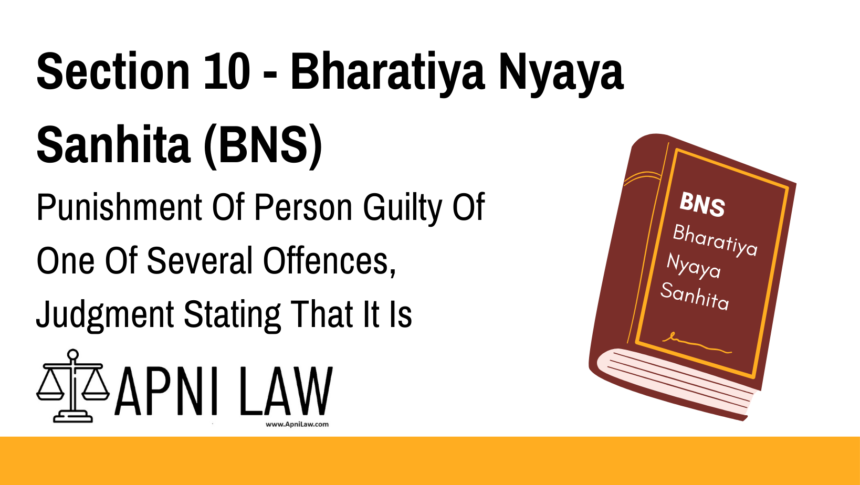Code
In all cases in which judgment is given that a person is guilty of one of several offences specified in the judgment, but that it is doubtful of which of these offences he is guilty, the offender shall be punished for the offence for which the lowest punishment is provided if the same punishment is not provided for all.
Explanation of Section 10 BNS
Section 10 of the Bharatiya Nyaya Sanhita (BNS), 2023 ensures that when there is uncertainty about the exact offence committed, the accused will receive the least severe punishment applicable to the possible offences.
Key Takeaways:
- Applicability in Cases of Doubt:
- If a court is unsure about which of multiple offences an accused has committed, but certain that one of them occurred, this section applies.
- Lesser Punishment Prevails:
- If the possible offences carry different levels of punishment, the court must impose the lightest punishment among them.
- Fair Treatment of the Accused:
- The law favors the accused when uncertainty exists, ensuring justice and fairness in sentencing.
Illustration of Section 10 BNS
Example: Theft or Criminal Breach of Trust?
A person is accused of stealing money from his employer. However, it is unclear whether this was:
- Theft (Section 304 BNS) – punishable by rigorous imprisonment up to 3 years
- Criminal Breach of Trust (Section 307 BNS) – punishable by rigorous imprisonment up to 7 years
🔹 Since the exact offence is doubtful, the court will impose the lesser punishment (maximum 3 years) under theft.
Legal Importance of Section 10 BNS
This section ensures fair sentencing by addressing cases where there is uncertainty in determining the specific crime committed. It helps to:
✅ Prevent excessive punishment when the offence is unclear.
✅ Ensure fairness in judicial decisions.
✅ Balance the interests of justice and the rights of the accused.
Common Questions & Answers
1. What is the purpose of Section 10 BNS?
It protects the accused from receiving a harsher sentence when the court is uncertain about the exact crime committed.
2. Does Section 10 apply if the offences carry the same punishment?
No. If the possible offences have identical punishments, this section does not apply since the sentence will remain the same.
3. Can a person be acquitted under Section 10 BNS due to doubt?
No. The court is certain that an offence occurred, but is unsure which one exactly. Acquittal is not an option under this section.
4. How does this section protect the accused?
It ensures that when in doubt, the court awards the least severe punishment rather than imposing a harsher one.
Conclusion
Section 10 of the Bharatiya Nyaya Sanhita (BNS), 2023 is a pro-justice provision that ensures accused persons are not unfairly punished when the court is uncertain about the exact offence. It reinforces the principle that doubt should benefit the accused in sentencing.
For more legal insights, visit ApniLaw 🚀








